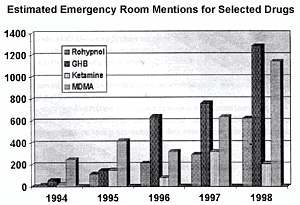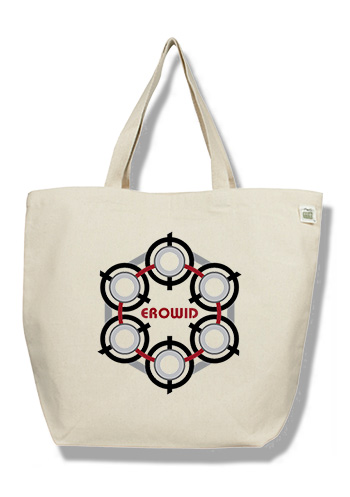California Association of Toxicologists
Page 4
9:00 am -- "The Responsibilities of the DEA in Regards to Rave Parties"
Michael Braun - DEA Assistant Special Agent in-charge
The next speaker was from the DEA. Michael Braun, Assistant Special Agent in charge, DEA Los Angeles field office.
 An interesting note was his introduction which tied into a couple of other introductions during the day, Braun said that he had been convinced to speak at this conference by the organizer with a bribe of several beers. He was friendly and jovial and told the story of how they had been commiserating about their sons' losses in little-league baseball and the conference organizer bought him a few beers at a pub with the explicit purpose of getting him to agree to talk to this group. While this is completely normal and just as it should be, it was very clear that the irony of this social practice is completely lost to these very intelligent people. Imagine instead that he had said "He promised me 3 hits of Ecstasy if I'd come and give a talk here, so we dropped some E talked about it and eventually I agreed to give a talk."
An interesting note was his introduction which tied into a couple of other introductions during the day, Braun said that he had been convinced to speak at this conference by the organizer with a bribe of several beers. He was friendly and jovial and told the story of how they had been commiserating about their sons' losses in little-league baseball and the conference organizer bought him a few beers at a pub with the explicit purpose of getting him to agree to talk to this group. While this is completely normal and just as it should be, it was very clear that the irony of this social practice is completely lost to these very intelligent people. Imagine instead that he had said "He promised me 3 hits of Ecstasy if I'd come and give a talk here, so we dropped some E talked about it and eventually I agreed to give a talk."
Unfortunately he didn't talk at all about raves or parties, but instead his talk was an overview of the DEA's view of the international ecstasy trade. He said that the DEA had 100 agents in his 'area', but I didn't get a sense of exactly what the boundaries of his area are, so it wasn't a useful statistic. He said that the DEA currently has 4,515 special agents & 2,053 state and local police who are sworn as DEA officers.
He gave the prices of MDMA as about .50$ per to produce, 2$ at the highest level wholesale price, 8$ a hit at mid wholesale, which he described as "large sellers buying 500-1000 pills at a time" and 10-40$ retail per pill at the individual pill level.
He described pill logos as "marketing techniques" as did his DEA literature. He talked about how there is a huge disparity in the sentencing for MDMA versus methamphetamine and considered this a problem that needs to be resolved: 10 kilos of MDMA gets you 5-6 years of prison time while 10 kilos of meth gets 20-25 years in custody.
He listed the precursors of MDMA and talked about how most of the production is in the Netherlands while most of the precursors come from China, India, Poland, and Germany and few other states with 'weak' controls. He said that "the problem is spreading exponentially around the country." He said that drugs were being distributed and sold by people of many different races "this is the rainbow coalition here, folks".
He said that the largest lab seized in the US had a maximum capacity of 20 pounds of MDMA and that most labs in the US are very small with a maximum output of a few ounces. He said that LA is a major distribution hub for the US and that on 12/21/99 US customs seized a 100 pounds of MDMA which lead to an additional 600 pound seizure. He (and another presenter later) said that large busts like these don't affect the market at all: even huge busts of around 1 million doses like this don't impact the availability on the street.
He said that FedEx, DHL, and UPS are all used a lot in the distribution, but that they all work closely with the DEA.
He said that the trends are a future large increase in MDMA availability and sales, production in Mexico, "3-5 years Mexican production will put European MDMA manufacturing out of business", increase in domestic labs, production in Asia for 'regional consumption'.
"The DEA does not have a role in rave parties."
He said "Prevention, education, and law enforcement has been successful." Although I have no idea by what measure he would gauge success if this is true.
Overall his talk was standard DEA fare. He seemed like an intelligent person who believed in what he was doing. He was 'smoother' than the rest of the speakers, most of whom seemed more academic or down to earth. He reminded me of a business executive more than a police officer.
There was then a small break where people re-dosed on coffee.
NextPage
Michael Braun - DEA Assistant Special Agent in-charge
The next speaker was from the DEA. Michael Braun, Assistant Special Agent in charge, DEA Los Angeles field office.
 An interesting note was his introduction which tied into a couple of other introductions during the day, Braun said that he had been convinced to speak at this conference by the organizer with a bribe of several beers. He was friendly and jovial and told the story of how they had been commiserating about their sons' losses in little-league baseball and the conference organizer bought him a few beers at a pub with the explicit purpose of getting him to agree to talk to this group. While this is completely normal and just as it should be, it was very clear that the irony of this social practice is completely lost to these very intelligent people. Imagine instead that he had said "He promised me 3 hits of Ecstasy if I'd come and give a talk here, so we dropped some E talked about it and eventually I agreed to give a talk."
An interesting note was his introduction which tied into a couple of other introductions during the day, Braun said that he had been convinced to speak at this conference by the organizer with a bribe of several beers. He was friendly and jovial and told the story of how they had been commiserating about their sons' losses in little-league baseball and the conference organizer bought him a few beers at a pub with the explicit purpose of getting him to agree to talk to this group. While this is completely normal and just as it should be, it was very clear that the irony of this social practice is completely lost to these very intelligent people. Imagine instead that he had said "He promised me 3 hits of Ecstasy if I'd come and give a talk here, so we dropped some E talked about it and eventually I agreed to give a talk." Unfortunately he didn't talk at all about raves or parties, but instead his talk was an overview of the DEA's view of the international ecstasy trade. He said that the DEA had 100 agents in his 'area', but I didn't get a sense of exactly what the boundaries of his area are, so it wasn't a useful statistic. He said that the DEA currently has 4,515 special agents & 2,053 state and local police who are sworn as DEA officers.
He gave the prices of MDMA as about .50$ per to produce, 2$ at the highest level wholesale price, 8$ a hit at mid wholesale, which he described as "large sellers buying 500-1000 pills at a time" and 10-40$ retail per pill at the individual pill level.
He described pill logos as "marketing techniques" as did his DEA literature. He talked about how there is a huge disparity in the sentencing for MDMA versus methamphetamine and considered this a problem that needs to be resolved: 10 kilos of MDMA gets you 5-6 years of prison time while 10 kilos of meth gets 20-25 years in custody.
He listed the precursors of MDMA and talked about how most of the production is in the Netherlands while most of the precursors come from China, India, Poland, and Germany and few other states with 'weak' controls. He said that "the problem is spreading exponentially around the country." He said that drugs were being distributed and sold by people of many different races "this is the rainbow coalition here, folks".
He said that the largest lab seized in the US had a maximum capacity of 20 pounds of MDMA and that most labs in the US are very small with a maximum output of a few ounces. He said that LA is a major distribution hub for the US and that on 12/21/99 US customs seized a 100 pounds of MDMA which lead to an additional 600 pound seizure. He (and another presenter later) said that large busts like these don't affect the market at all: even huge busts of around 1 million doses like this don't impact the availability on the street.
He said that FedEx, DHL, and UPS are all used a lot in the distribution, but that they all work closely with the DEA.
He said that the trends are a future large increase in MDMA availability and sales, production in Mexico, "3-5 years Mexican production will put European MDMA manufacturing out of business", increase in domestic labs, production in Asia for 'regional consumption'.
"The DEA does not have a role in rave parties."
He said "Prevention, education, and law enforcement has been successful." Although I have no idea by what measure he would gauge success if this is true.
Overall his talk was standard DEA fare. He seemed like an intelligent person who believed in what he was doing. He was 'smoother' than the rest of the speakers, most of whom seemed more academic or down to earth. He reminded me of a business executive more than a police officer.
There was then a small break where people re-dosed on coffee.


